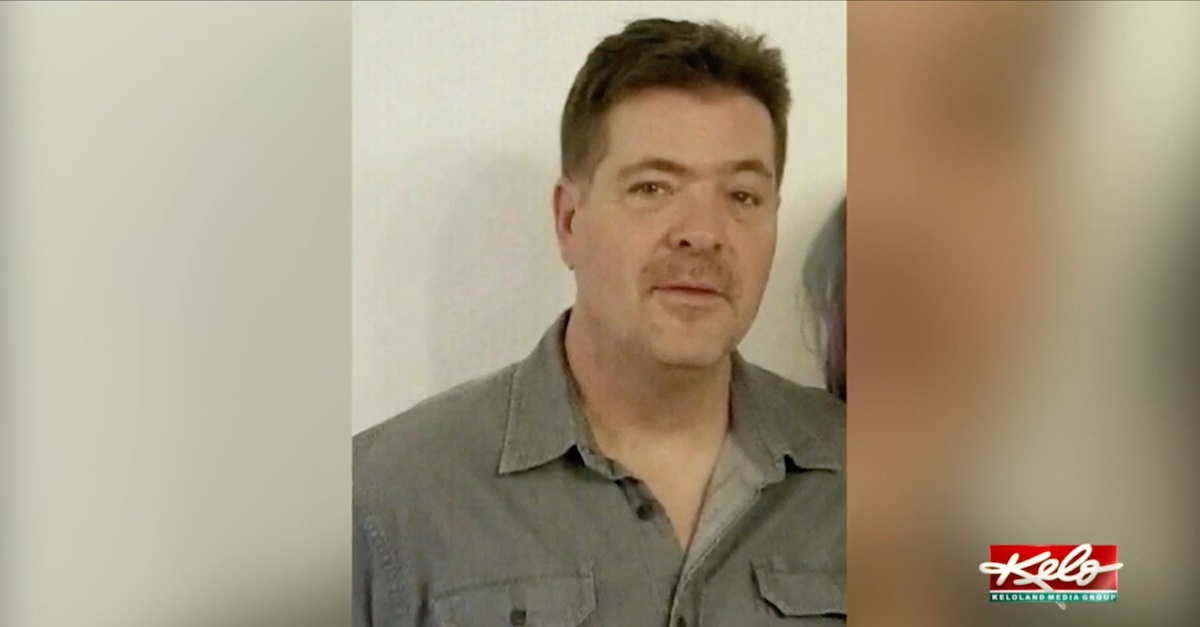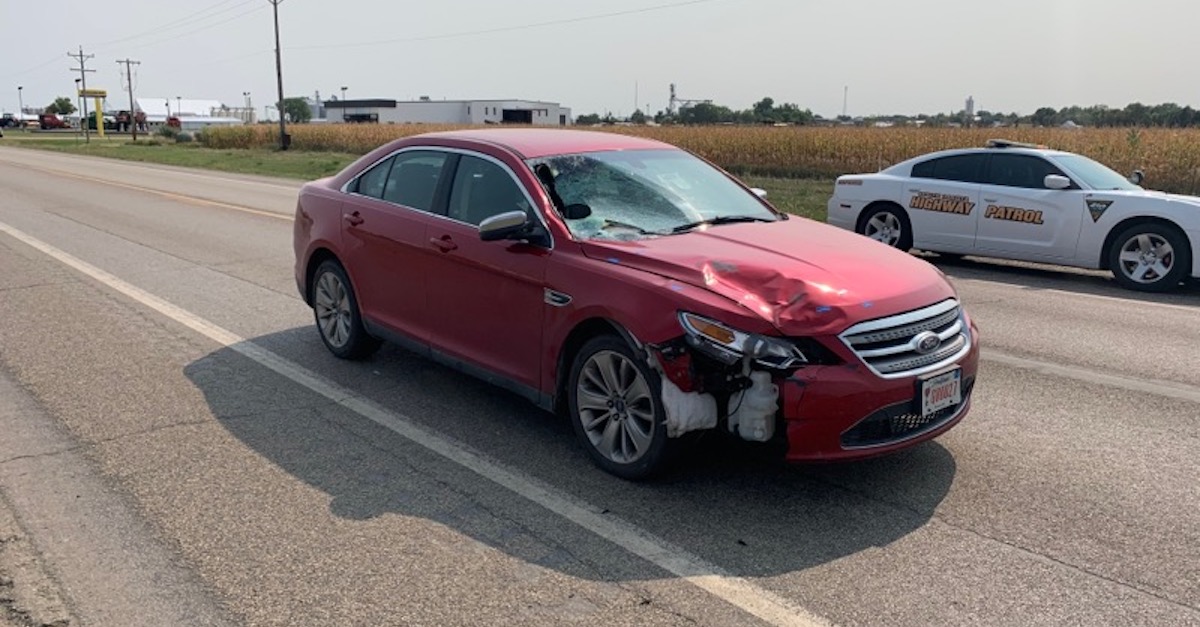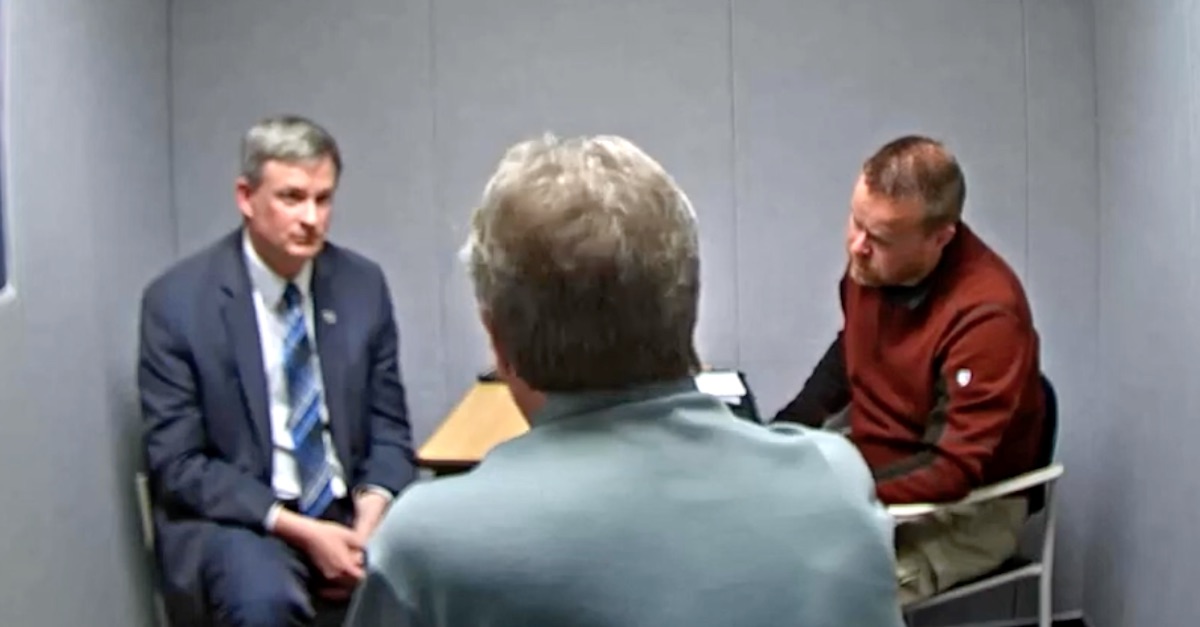
Jason Ravnsborg
South Dakota Attorney General Jason Ravnsborg (R) on Thursday pleaded no contest two of the three misdemeanor charges related to a deadly nighttime crash which killed a man east of Highmore, S.D., on September 12, 2020. Ravnsborg’s ultimate punishment is a series of two $500 fines and about $3,700 in court costs. He will serve no jail time despite the underlying statute authorizing a potential of 30 days in jail for each two of the two offenses.
After the family of Joseph Boever, the 55-year-old man who died in the crash, slammed Ravnsborg as a “coward,” Ravnsborg’s defense attorney Timothy Rensch called them out for treating this like a homicide case when no such charge has been brought.

Victim Joseph Boever appears in an image shared with Sioux Falls CBS affiliate KELO-TV.
“Accidents happen,” Rensch said at one point during his arguments for as light a punishment as the law could possibly afford for Ravnsborg. “People die. It happens.”
The defense attorney at time seemed to criticize the victim’s family for demanding a harsher punishment. He said the family’s view of the incident legally didn’t fit the facts of the case and therefore was wrong.
Ravnsborg was not personally present. He appeared through Rensch via a power of attorney approved by the judge. Rensch noted that defendants in South Dakota misdemeanor cases have a legal right not to appear personally and that his client should have the same rights as any other person in South Dakota in that regard.
The judge suggested at the initiation of the proceeding that it was highly unlikely that the state’s highest law enforcement officer would serve even a single day behind bars in connection with the deadly crash which left Boever’s body by the side of the road for hours before it was discovered.
“I don’t think a jail sentence in the context of this case would have had a particular disciplinary benefit,” the judge said at the initiating of the Thursday sentencing proceeding.
The judge also noted that his review of Boever’s medical records turned up nothing relevant toward the proceeding and would not factor into the matter. Citing one of Boever’s relatives, Rensch had suggested that Boever was a depressed alcoholic and possibly suicidal and demanded to see the victim’s data. Other relatives harshly disagreed with the characterization of the victim, and the judge ultimately rubbished Rensch’s attempt to see the man’s files.

An image shows the car Jason Ravnsborg was driving when he struck and killed a man on September 12, 2020, at 10:21 p.m. Ravnsborg said he believed he struck a deer. (Image via the South Dakota Department of Public Safety.)
Ravnsborg pleaded no contest to charges of operating a vehicle while using a mobile electronic device and for improperly changing lanes. The state agreed to dismiss the third count of careless driving as part of the deal.
The state said it would also remain silent as to the defendant’s request for a suspended sentence. In other words, prosecutors could have fought it and demanded jail time. They didn’t.
Prosecutors indicated that Ravnsborg was reading conspiracy theory “political blogs” and “weather apps” prior to the crash. He was “clearly outside of his lane of traffic” when he struck Boever, the state reiterated.
“The facts have been everywhere,” the prosecutor noted. “This case has been very publicly played out; there has been political underpinnings; there has been more information spilled out in this case I would say probably than any other case I have witnessed in my 20 years of practicing law.”
“For the family of Joe Boever, my condolences sincerely go to them. I know the recompense they seek cannot be given in this court today,” the prosecutor said regarding Boever’s family. “I know they’re frustrated with the process, and to all of them I am very sorry for the loss they have endured.”
The state suggested that Ravnsborg should be ordered to help “educate young drivers” about the dangers of driving while using a cell phone.
“He’s in a wonderful position to be able to do some of that education,” the prosecutor continued, “and I think that would be very appropriate for the court to consider in this case.”
“Albeit misdemeanor charges, the worst possible and harshest possible result occurred,” the state said while noting that Boever died at the hands of the attorney general. “We are dealing with what has been a horrific year for a lot of people.”
The state backed requests by the Boever family for Ravnsborg to pay the victim’s funeral expenses and other court-related costs.
“It’s minimal in comparison to the emotional loss that she has endured,” the prosecutor said while referencing a written request to the court from the victim’s family.
Several members of Boever’s family told the judge that they were outraged at the thought of the AG serving no jail time.
“We have waited 349 long days for this case to come to an end, and this is not the end we hoped for or expected,” said Jane Boever, the victim’s sister. “Our brother laid in the ditch for almost twelve hours” before his body was discovered, she said.
“This is inexcusable. If an ordinary person had committed these crimes, we believe the case would have been closed months ago,” she continued. “Instead, State Attorney General Jason Ravnsborg ran our brother down and then used his position, knowledge, and resources to selfishly string this case along and more importantly widen and deepen the wounds of our loss. We feel that at no point has the defendant shown any remorse and has instead demonstrated callousness with respect to the life he took and the victim’s family and friends.”
She also accused Ravnsborg of an “arrogance toward the law he as an attorney general is supposed to uphold.”
“He has betrayed the morals and values he possesses to stand for,” she said while complaining that the family has never had the chance to face the attorney general due to his lack of appearances in court.
Jane Boever said a “couple of fines” were completely inadequate punishments for her brother’s death.
“I lost the love of my life,” said Jennifer Boever, the victim’s wife. “Joseph was a highly intelligent man” and a “caring man” who was also known for his “compassion” as a career nurse, she added.
“His actions are incomprehensible, inexcusable, and cannot be forgiven,” Jennifer Boever added with reference to Ravnsborg. She said she was “financially burdened” by the loss of her husband and that her own college plans were derailed by the deadly crash.
Jennifer Boever also said she believed “any normal person . . . would already be in jail.”
“He broke his own law,” the victim’s wife added. “His law states ‘do not use your phone.’ And what did he do? He was using his phone and he ended up killing my husband that night. And it has taken an emotional toll beyond anything I have ever seen. So, I am against the fact that he will not get jail time at all.”
“I understand that, ma’am,” the judge replied.
Rensch, the defense attorney, started his arguments to the court by indicating that the case was neither a vehicular manslaughter nor homicide case. He said the evidence indicated that the case involved negligence alone. And he openly chided the victim’s family for failing to understand the difference between those types of cases under South Dakota state law.
“That’s what is the mix-up here with the family. They think it’s a homicide case.”
“Accidents happen,” Rensch said. “People die. It should not happen. Nobody wants anybody to die. Jason Ravnsborg didn’t want this fellow to die. Nobody wants any family to suffer the loss of someone they love. And nobody blames a family for disliking greatly the person who was involved. And, in this circumstance, he should not be treated or sentenced like somebody who is facing [a more serious] charge.”
“What happened out there that night could have happened to anybody,” the defense attorney said. “Anybody who’s gone across rumble strips knows that it happens.”
The defense attorney continued on by calling Ravnsborg an “honorable man” who earned a “bronze star” in the armed forces.
Rensch also said it was “conclusively proven” that Ravnsborg’s phone was “not in use at the time of this collision.”
Yet his client pleaded no contest to distracted driving.
Rensch also said the Boever family was incorrect by calling Ravnsborg “reckless.” Rensch said recklessness is the legal standard for a manslaughter case. A vehicular homicide case would have required evidence evidence that Ravnsborg was “under the influence of alcohol or drugs.” No evidence was available in this case to suggest recklessness, drugs, or alcohol were involved in the crash, Rensch argued.
“What’s why we’re not here today to deal with attempting to make right the death of Mr. Boever,” Rensch continued. “We’re here to deal with two misdemeanor traffic infractions, the lowest level of offense we have in this state — a Class 2 misdemeanor.”
Rensch acknowledged that the Boever family had threatened a civil lawsuit.
“Just because he’s the attorney general doesn’t mean accidents can’t happen,” Rensch said. He suggested his client had “no alcohol,” “no drugs,” called 911 immediately, met with the sheriff, and even borrowed the sheriff’s car to continue on his journey the night of the crash — the latter being the way “small town” people oftentimes help one another when accidents happen.
“A car can go 100 feet in the blink of an eye,” Rensch continued. The “sheriff,” the “tow truck driver,” and “nobody driving by” ever saw Boever’s body until the next day, the defense lawyer added while suggesting that Ravnsborg’s failure to realize he had struck a man was forgivable.
“My client was no coward,” Rensch argued. “He did not walk away and leave someone unattended for any malicious or bad purpose.”
Ravnsborg indicated in a 911 call at the time of the crash that he thought he hit a deer. Investigators later told the AG that Boever’s glasses were inside his vehicle.
“His face was in your windshield, Jason. Think about that,” an interrogator told Ravnsborg during a subsequent interview. Ravnsborg denied knowing anything about the glasses found in his Ford Taurus.

A still frame from a state video shows Jason Ravnsborg’s interrogation video.
“My client is no coward,” Rensch again articulated at sentencing. “This is not a man who had something to hide.”
Rensch said Ravnsborg immediately told people how he believed the crash happened and should be credited for making statements which could have been used against him at trial. The defense expounded on that point:
He’s a lawyer. And every lawyer in the world knows that if you’re accused of a crime, you clam up and you shut up. But he didn’t do that. He marched right in and he told them the way he thought it happened. Told them the way he thought it happened. This is hardly a guy who’s trying to use his connections to improve his situation. He did that legally to his detriment because he has honor about him.
Rensch also said it was wrong for anyone to think poorly of Ravnsborg for appearing through his attorney at the misdemeanor sentencing hearing because all people accused of similar offenses in South Dakota have the right to appear through their attorney. He then railed against “political attacks” against his client.
“I’m asking the court to give him a suspended imposition” on each of the two counts “for 30 days,” Rensch continued. “He qualifies.”
But the defense attorney also acknowledged the courts of South Dakota were “often” known to “stretch[] out” sentences of this type.
Citing state statutes, Rensch further argued that by pleading no contest, Ravnsborg should legally be allowed to avoid paying the various forms of restitution that Boever’s family requested. Rensch explained that the restitution statute applied to “criminal activities” for which there is a “plea of guilty or a verdict of guilty upon which a judgment of conviction may be rendered.”
Rensch repeated the statute. It doesn’t mention “no contest” pleas — which is what Ravnsborg submitted. And therefore, the “court doesn’t have the authority to grant the restitution requested,” Rensch argued.
Furthermore, “the mother has no standing to claim pecuniary damages because she could not recover any in a civil action,” Rensch said with reference to threats by Boever’s mother that she would sue the attorney general civilly under South Dakota law. “The only civil action available is a wrongful death manner . . . Mr. Boever’s wife is the one who is going to file that, and we know that she is the person who has standing to do that.”
Rensch also said Ravnsborg should not be required to pay the costs of the investigation, the autopsy fees, or any related expenses incurred by the authorities who examined the case. He said those costs should be paid by the taxpayers. He also said it was “unfair” to attach those various “death costs” to Ravnsborg’s “traffic infraction.”
“My client didn’t want this gentleman to die,” Rensch said while acknowledging that a lot of people around the country hate his client. The defense attorney railed against so-called “false conspiracy theories” that suggested Ravnsborg was receiving special treatment.
“This is a mere accident,” he again argued — then cited five separate pedestrian fatalities where similar charges were filed. “Accidents happen,” Rensch again said.
The prosecutor retorted that “costs” sought by the state were separate from the “salaries” of investigators paid by the taxpayers.
“They are legitimate” costs and requests for restitution, the prosecutor said while acknowledging she was well familiar with the technical aspects of South Dakota law.
A victim’s advocate then explained that the Boever family had a general life insurance policy that covered other costs but was not directly related to funeral expenses.
The judge agreed with Rensch that the case involved only “traffic violations,” but the judge conceded that the outcome was “tragic and unnecessary.” He said the defendant clearly didn’t want the deadly outcome which resulted from his actions.
The judge reiterated that the maximum penalties allowed under state law were 30 days in jail and $500 in fines. But he explained that a “bond schedule” used by South Dakota courts would allow any typical defendant to pay $178.50 in fines and costs on one charge and $132.50 for the other — despite the $500 maximums.
“Obviously this isn’t the typical case,” the judge said while reasoning that higher amounts were necessary here.
“No jail time will be imposed in this case,” the judge added.
The judge declared Ravnsborg guilty of the two contemplated counts and ordered $500 fines on each of the two counts. He also ordered court costs of perhaps $66.50 for the Class 2 misdemeanors. Someone else started to correct the judge about the amounts allowed under a cost schedule for such misdemeanors; the judge said he would have to look up the precise amounts.
“Perhaps it’s somewhat unfortunate from Mr. Ravnsborg’s point of view, but because of the profile — the high profile of this case, I think that the various charges that the county is requesting here are legitimate with respect to the additional costs that are imposed,” the judge said with regards to other financial obligations being assessed against the defendant. “I think that — certainly — securing the area, had it been anyone else, they wouldn’t have taken that amount of cost, and certainly the high profile of the case led to, perhaps, greater examination” of the evidence.
So, the judge ordered Ravnsborg to pay $3,742.38 as “costs” to the county to reimburse monies expended during the investigation.
“Although I understand that a monetary award to the victim’s family or to the victim’s mother may help assuage some concerns here, it’s also correct there’s nothing the court’s going to do that’s going to make anyone happy in this case,” he continued.
“I’m going to deny the request for funeral costs,” the judge said while noting that the family had “insurance” proceeds to pay for the victim’s services. The judge said that ordering Ravnsborg to pay for the victim’s funeral was not “appropriate” in the “context of this case.”
“Any other costs or restitution or award are more properly handled — as you pointed out — through a wrongful death action,” the judge said, “which I understand is being contemplated currently.”
Loud sobbing could be heard over an audio-only feed of the proceeding, presumably from Boever’s family.
The judge ordered Ravnsborg to hold “significant public service event[s] over a period of five years, once each year, on or about the date of Mr. Boever’s death” to educate citizens about driving without paying attention to the road.
Rensch immediately retorted that it was illegal under state case law for the judge to order such a punishment to stretch out that far into the future.
“If the maximum penalty is only 30 days on each count, how can you want five years?” Rensch asked.
The judge said case law supported his decision that “probation periods can extend beyond the possible jail time, and I’m basing it on that.”
“That’s only in the case of a suspended execution of sentence or a suspended imposition of sentence, and this is neither,” Rensch said. “And I appealed a case on that here maybe two years ago; that’s why I have it fresh on my mind.”
The judge ordered the state to prepare an order of judgment based on what he said but that he would “take written responses” on whether or not he could, indeed, issue such an order for Ravnsborg to hold public service events five years into the future.
Resch also asked, and the judge ordered, that Ravnsborg’s two phones and car be released and returned to him. The state did not oppose that request.
The judge again said that perhaps no one would be pleased with the outcome of the case as he wrapped up the proceeding.
Shortly after the hearing, Ravnsborg released the following statement, which is reproduced in full as follows:
On September 12, 2020, two families were changed forever.
First and foremost, I am very sorry Joe Boever lost his life in this accident.
I am sorry to the entire family for the loss of their loved one. They have had to deal with the pain, anger, and sadness of this accident. With respect for Joe, his family, and the judicial process, I have fully cooperated with the investigation from the beginning and refrained from making statements to the media.
While nothing I say will bring Joe back, I believe it’s appropriate to share a few of my thoughts at this time.
Joe’s death weighs heavily on me and always will. I’ve often wondered why the accident occurred and all the things that had to have happened to make our lives intersect. I’ve wished thousands of times our paths would have crossed under different circumstances.
The media has reported many untrue, and misleading things they want you to believe are facts. Partisan opportunists from both sides of the aisle have manufactured rumors, conspiracy theories and made statements in direct contradiction to the evidence all sides agreed upon. These are the same people who try to take others down at any cost.
I ran to be your attorney general because I believe in the law; I believe in fairness, due process, and doing what’s right. Now, having experienced the legal system from both sides, I renew my commitment to be transparent and responsive to the needs of the people of South Dakota.
We have built an incredible team of hard-working professionals who seek to serve you in the Attorney General’s office each day. We’ve made significant accomplishments in record time.
We still face challenges. We will continue the dialogue about marijuana and how to regulate it. We’re finalizing the terms of the $26 billion opioid settlement to address opioids and fentanyl and still battling the meth epidemic.
I do not know all the Lord has in store for me, but I trust in Him. As I continue my service as your attorney general, I’ll keep fighting for you, just as I have since the day I took office. May God bless each of you, and may God continue to bless South Dakota.
Editor’s note: this piece has been substantially updated since its initial publication to include additional quotes and context from the plea and sentencing hearing and to include Ravnsborg’s statement.
[Image of Ravnsborg via Fox News screengrab. Images of interrogation and vehicle via the South Dakota Department of Public Safety. Image of Boever via KELO-TV screengrab.]